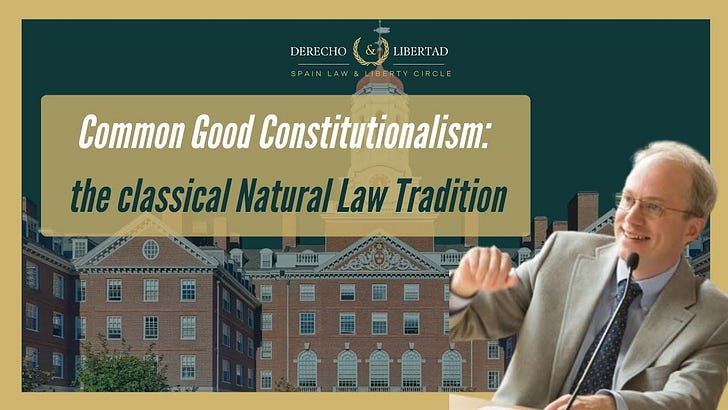This fall, I’ve done two swings through Europe to talk about Common Good Constitutionalism (CGC) and classical legal theory at various universities and institutions, and to learn from a series of outstanding scholars and jurists. The first swing involved stops in Paris, Leuven (Louvain), and Brussels. Ok, the Paris part of that trip was just for fun, but Leuven involved a superb conference on Marian political philosophy through Sedes Sapientiae, and in Brussels I had the privilege of speaking to the excellent Association of Catholic Jurists. The second swing involved talks at universities in Pamplona (University of Navarra), Barcelona (Abat Oliba CEU), Milan (Università Cattolica), and Rome (Pontifical University Santa Croce, where I spoke twice), followed by a fascinating conference with the French journal Le Grand Continent in Saint-Vincent in far northwest Italy, the old heartland of Savoy. I’m grateful to these institutions for the invitations, and wish to extend special thanks to the scholars, jurists and writers who arranged or hosted these events, including Profs. Fernando Simon Yarza, Pablo Nuevo Lopez, Alessandro Mangia, and Fr. Cristian Mendoza Ovando, and from Le Grand Continent, Gilles Gressani and Marin Saillofest.
Unfortunately most of these talks were not recorded, but I have embedded below the video of my talk at Universitat Abat Oliba CEU in Barcelona. It includes a substantive and excellent introduction by Prof. Pablo Nuevo Lopez, who rightly stressed that while CGC is sometimes taken as strictly normative, as a proposal to discard originalism and replace it with classical legal theory, that is not the thesis of the book. Rather, the main argument is as much about judicial and lawyerly practice as it is about theory, as much about fit as about justification. Even professedly originalist judges always already decide according to some theory or other of the common good, and according to classical principles — they cannot help doing so. The originalist theory they adumbrate in speeches to the Federalist Society is belied by their practice on the bench. Originalism is not so much wrong as it is an illusion. Judge Paul Matey of the Third Circuit has written eloquently on the gap between originalist theory and judicial practice here and here; his words carry extra weight given his internal perspective as a sitting federal appellate judge, and I highly recommend his contributions.
In the video, after Prof. Lopez’s introduction, I give my basic “stump speech” on CGC and respond to many fun and interesting questions from faculty and students. The Q&A starts around 47:47 if you want to skip ahead. Hope you enjoy!



